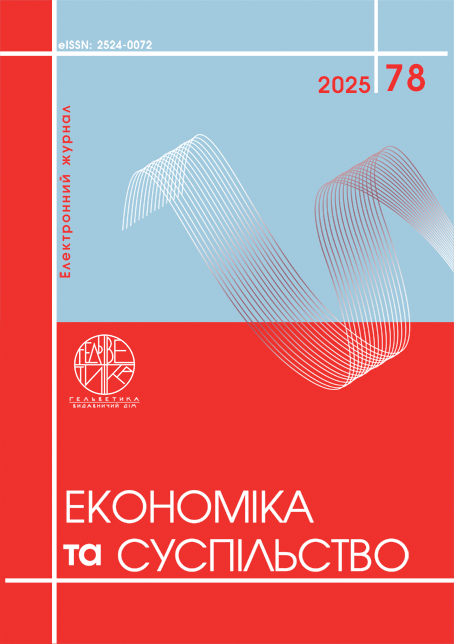DIGITALIZATION OF THE ECONOMY AS A NEW PARADIGM OF SUSTAINABLE DEVELOPMENT AND COMPETITIVENESS
Abstract
The article examines the digitalization of the economy as a new paradigm that determines the directions of sustainable development and competitiveness of national economies. The purpose of the article is to theoretically substantiate and develop conceptual approaches to the digitalization of the economy as a key driver of sustainable development and competitiveness, as well as to identify practical mechanisms for integrating digital technologies into national economic growth strategies, taking into account current global and local challenges. Research results. Identify key trends and drivers of digital transformation at the global and national levels. Existing approaches to assessing the effectiveness of digitalization are systematized, taking into account economic, social and environmental parameters. Opportunities and risks of digitalization in the context of achieving sustainable development goals are investigated. A model for integrating digital solutions into competitiveness strategies adapted to Ukrainian realities is proposed. Recommendations for public policy and the business environment on the formation of a sustainable digital economy are developed. The importance of an integrated approach to digitalization that takes into account the balance between innovation, social justice and environmental responsibility is emphasized. In the scientific discourse, the digitalization of the economy is seen as a complex process of transforming economic relations, infrastructure, and the institutional environment through the widespread use of digital technologies. It serves as a meta-platform for integrating innovations into production, finance, trade, education, environmental management, and the social sphere. The introduction of digital technologies helps to optimize production processes, increase the efficiency of resource use, develop innovative business models, and expand access to social services. At the same time, digital transformation stimulates the development of new competencies and digital culture, which is a prerequisite for the economy to adapt to rapid change.
References
Воронкова В.Г., Череп А.В., Череп О.Г. Розвиток мережевої (інтернет-економіки) в умовах цифровізації: принципи, закони, тенденції розвитку. Science and society: trends of interaction : collective monograph / Compiled by V. Shpak; Chairman of the Editorial Board S. Tabachnikov. Sherman Oaks, California : GS Publishing Services, 2023. Р. 31-48. DOI: 10.51587/9798-9866-95945-2023-012-31-48
Череп А., Череп О., Огренич Ю., Курченко М. Досвід Данії з цифровізації бізнес-процесів як приклад для України. Вісник Хмельницького національного університету. Серія: Економічні науки. 2023. Т. 324. № 6. С. 164–168.
Brynjolfsson, E., & McAfee, A. The Second Machine Age: Work, Progress, and Prosperity in a Time of Brilliant Technologies. W. W. Norton & Company. 2014.
Brennen, S., & Kreiss, D. Digitalization. In The International Encyclopedia of Communication Theory and Philosophy. 2016. Р. 1–11. DOI: https://doi.org/10.1002/9781118766804.wbiect111
Castells M. The Rise of the Network Society. Blackwell.1996.
European Commission. (2021). Digital Europe Programme 2021–2027. URL: https://digital-strategy.ec.europa.eu
Floridi L. The Ethics of Artificial Intelligence and Robotics. The Stanford Encyclopedia of Philosophy. Retrieved from. 2020. URL: https://plato.stanford.edu/entries/ethics-ai/
Brousseau, E., & Curien, N. Digital Sovereignty: Rethinking Europe's Digital Future. Springer. 2022.
OECD. Digital Economy Outlook 2022. OECD Publishing. URL: https://www.oecd.org/digital/
Tapscott D. The Blockchain Revolution: How the Technology Behind Bitcoin Is Changing Money, Business, and the World. Portfolio. 2016.
Eurofound. Automation, Digitalisation and Platforms: Implications for Work and Employment. 2022. URL: https://www.eurofound.europa.eu
Negroponte N. Being Digital. NY : Knopf. 1995. 256 р.
Schwab K. The Fourth Industrial Revolution. NY: Crown Business. 2016. 192 р.
.Shoshana Z. The Age of Surveillance Capitalism. NY: PublicAffairs. 2019. 704 р.
Yuval Noah Harari. Sapiens: A Brief History of Humankind. United Kingdom, Jonathan Cape. 2014. 464 р.
Voronkova, V. H., Cherep, A. V., & Cherep, O. H. (2023). Rozvytok merezhevoi (internet-ekonomiky) v umovakh tsyfrovizatsii: pryntsypy, zakony, tendentsii rozvytku [Development of network (Internet economy) in the conditions of digitalization: principles, laws, development trends]. In V. Shpak (Comp.), Science and society: trends of interaction. GS Publishing Services. P. 31–48. DOI: https://doi.org/10.51587/9798-9866-95945-2023-012-31-48 (in Ukrainian)
Cherep, A., Cherep, O., Ohrenych, Yu., & Kurchenko, M. (2023). Dosvid Danii z tsyfrovizatsii biznes-protsesiv yak pryklad dlia Ukrainy [Danish experience in digitalization of business processes as an example for Ukraine]. Herald of Khmelnytskyi National University. Economic Sciences, 324(6). P. 164–168. (in Ukrainian)
Brynjolfsson, E., & McAfee, A. (2014). The second machine age: Work, progress, and prosperity in a time of brilliant technologies. W. W. Norton & Company.
Brennen, S., & Kreiss, D. (2016). Digitalization. In The International Encyclopedia of Communication Theory and Philosophy. P. 1–11. DOI: https://doi.org/10.1002/9781118766804.wbiect111
Castells, M. (1996). The rise of the network society. Blackwell.
European Commission. (2021). Digital Europe Programme 2021–2027. Retrieved from https://digital-strategy.ec.europa.eu
Floridi, L. (2020). The ethics of artificial intelligence and robotics. In E. N. Zalta (Ed.), The Stanford Encyclopedia of Philosophy (Fall 2020 Edition). Retrieved from https://plato.stanford.edu/entries/ethics-ai/
Brousseau, E., & Curien, N. (2022). Digital sovereignty: Rethinking Europe’s digital future. Springer.
OECD. (2022). Digital economy outlook 2022. OECD Publishing. Retrieved from https://www.oecd.org/digital/
Tapscott, D. (2016). The blockchain revolution: How the technology behind Bitcoin is changing money, business, and the world. Portfolio.
Eurofound. (2022). Automation, digitalisation and platforms: Implications for work and employment. Retrieved from https://www.eurofound.europa.eu
Negroponte, N. (1995). Being digital. Knopf.
Schwab, K. (2016). The fourth industrial revolution. Crown Business.
Zuboff, S. (2019). The age of surveillance capitalism. PublicAffairs.
Harari, Y. N. (2014). Sapiens: A brief history of humankind. Jonathan Cape.
Copyright (c) 2025 Алла Череп, Валентина Воронкова, Олександр Череп

This work is licensed under a Creative Commons Attribution 4.0 International License.


